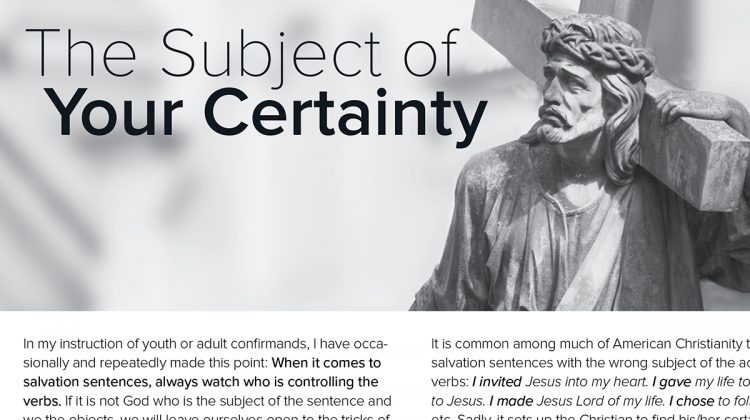
In my instruction of youth or adult confirmands, I have occasionally and repeatedly made this point: When it comes to salvation sentences, always watch who is controlling the verbs. If it is not God who is the subject of the sentence and we the objects, we will leave ourselves open to the tricks of Satan.
The last question I have used in the oral exam of adults before the elders has been: “If you were to die tonight, why would you go to heaven?” More often than not, the response would be: “Because I believe in Jesus as my Savior.” I assure them that most Christians would answer in this way and it is not wrong, but a better way to answer is: “Because Jesus has done all to save me.” The latter response is keeping God as the subject and me, the sinner, as the object. The former response leaves one vulnerable to Satan’s diabolical tricks. He, along with your old man of sin, can say: “You believe in Jesus? Let’s review your sinful life and see how much you really believe in Him.” Then all certainty evaporates.
On the Sunday of Easter 7, the Old Testament historical lesson is from Ezekiel 36:25-27 (ELH p. 203). Notice how God is the subject of the action verbs regarding His people’s salvation: [Thus says the Lord God:] I will sprinkle clean water on you, and you shall be clean from all your uncleannesses, and from all your idols I will cleanse you. And I will give you a new heart, and a new spirit I will put within you. And I will remove the heart of stone from your flesh and give you a heart of flesh. And I will put my Spirit within you, and cause you to walk in my statutes and be careful to obey my rules. (Read the larger context in vv. 22-32 and see the additional times God is the subject of salvation sentences.) In its public reading, I have loved to highlight those emboldened words. (Similarly, we find the divine subject emphasized in salvation sentences for these Old Testament lessons from Isaiah 42: 1-9, 44: 21-23 and Jeremiah 33:6-9 throughout the Church Year.)
It is common among much of American Christianity to use salvation sentences with the wrong subject of the action verbs: I invited Jesus into my heart. I gave my life totally over to Jesus. I made Jesus Lord of my life. I chose to follow Jesus. etc. Sadly, it sets up the Christian to find his/her certainty of salvation within their own doing, and this will never produce certainty at all.
When I was a young man, shortly after high school, I was dabbling in such theology, thinking all such users of these expressions were able to live better Christian lives than we Lutherans ever could. But the more I pursued this brand of Christianity, the more I became frustrated with myself. I was blessed with having something I memorized in confirmation class constantly come back to me in my frustration: “I cannot by my own reason or strength believe in Jesus Christ my Lord, or come to Him; but the Holy Ghost has called me by the Gospel, enlightened me with His gifts, sanctified and kept me in the true faith …” Luther’s opening words to the explanation of the Third Article of the Apostles’ Creed not only saved me from that wretched self-focused theology, but still to this day is my favorite portion of Luther’s Small Catechism.
Our gracious Lord wants you to be certain of your salvation. I pray, my fellow redeemed, you remain blessed in all your salvation sentences by keeping Him rightly as the subject and you as the blessed object. Let the devil be damned with all his accursed lies. See you in heaven!
Rev. Glenn Obenberger